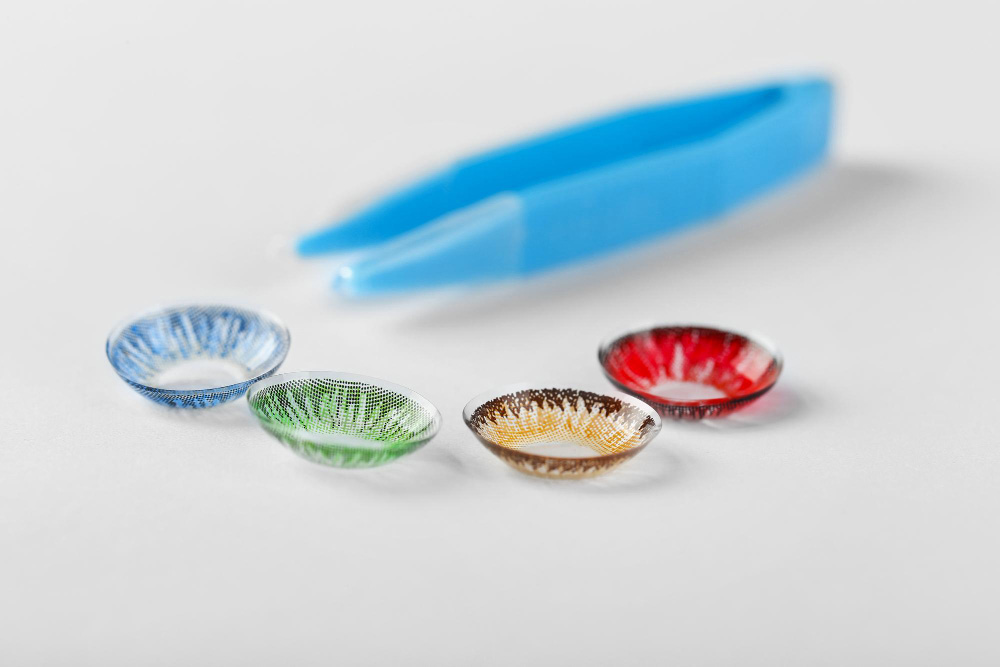Different Types of Contact Lenses: A Comprehensive Guide August 20, 2024

Contact lenses have revolutionized the way people correct their vision, offering a convenient and effective alternative to glasses. However, with so many different types of contact lenses available, it can be challenging to know which one is right for you. This comprehensive guide will walk you through the various types of contact lenses, their benefits, and how to choose the best option for your needs.
1. Soft Contact Lenses
Soft contact lenses are the most common type of contact lenses worn today. Made from flexible, water-containing plastics called hydrogels, they conform to the shape of the eye, providing comfort and ease of use.
Types of Soft Contact Lenses:
- Daily Disposable Lenses: Designed for single-use, these lenses are worn once and then discarded, making them convenient and hygienic.
- Bi-weekly and Monthly Lenses: These lenses are designed to be worn for up to two weeks or a month before being replaced. They require regular cleaning and storage.
- Toric Lenses: Specially designed for people with astigmatism, these lenses correct the uneven curvature of the eye.
- Multifocal Lenses: These lenses provide correction for both distance and near vision, making them ideal for people with presbyopia.
2. Rigid Gas Permeable (RGP) Lenses
RGP contact lenses, also known as hard lenses, are made from durable plastic that allows oxygen to pass through to the cornea. They offer sharper vision compared to soft lenses and are often recommended for people with certain eye conditions.
Benefits of RGP Lenses:
- Sharper Vision: RGP lenses maintain their shape on the eye, providing clear and consistent vision.
- Durability: These lenses are more durable and resistant to deposits than soft lenses, making them cost-effective over time.
- Custom Fit: RGP lenses can be custom-made to fit your eyes perfectly, offering a personalized vision correction solution.
3. Hybrid Contact Lenses
Hybrid contact lenses combine the best of both soft and RGP lenses. They have a rigid center like RGP lenses, providing sharp vision, but a soft outer ring for added comfort.
Who Should Consider Hybrid Lenses?
- People who need the clarity of RGP lenses but prefer the comfort of soft lenses.
- Those with conditions like keratoconus, where the cornea is irregularly shaped.
- Individuals who experience discomfort with traditional RGP lenses.
4. Scleral Contact Lenses
Scleral contact lenses are larger in diameter than traditional lenses, covering not just the cornea but also a part of the white of the eye (sclera). They are often used to treat specific eye conditions and provide excellent comfort and stability.
Benefits of Scleral Lenses:
- Comfort: The larger size of scleral lenses allows them to vault over the cornea, reducing discomfort.
- Stability: Scleral lenses are more stable on the eye, reducing the likelihood of them shifting out of place.
- Protection: These lenses can protect the eye’s surface, making them ideal for people with dry eyes or corneal irregularities.
5. Extended Wear Lenses
Extended wear contact lenses are designed for continuous use, including overnight wear. They are typically made from silicone hydrogel, a material that allows more oxygen to reach the eye.
Advantages of Extended Wear Lenses:
- Convenience: These lenses can be worn for up to 30 days without removal, making them ideal for busy lifestyles.
- Flexibility: Extended wear lenses are available in various types, including daily, weekly, and monthly options.
How to Choose the Right Contact Lenses
Choosing the right contact lenses depends on several factors, including your lifestyle, vision needs, and any existing eye conditions. Here are a few tips to help you make the best decision:
- Consult with an Eye Care Professional: Always consult with an optometrist or ophthalmologist to determine the best type of lenses for your eyes.
- Consider Your Lifestyle: If you have a busy lifestyle, daily disposables or extended wear lenses might be the best option. If you need precise vision correction, RGP or hybrid lenses may be more suitable.
- Think About Comfort: If comfort is a top priority, soft lenses or scleral lenses might be ideal.
Conclusion
Understanding the different types of contact lenses can help you make an informed decision that meets your vision needs and lifestyle. Whether you choose soft lenses, RGP lenses, hybrids, or scleral lenses, the right choice will provide clear, comfortable vision. Always consult with an eye care professional to ensure you select the best option for your eyes.
